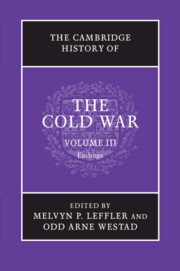Book contents
- Frontmatter
- 1 The Cold War and the intellectual history of the late twentieth century
- 2 The world economy and the Cold War, 1970–1990
- 3 The rise and fall of Eurocommunism
- 4 The Cold War and Jimmy Carter
- 5 Soviet foreign policy from détente to Gorbachev, 1975–1985
- 6 Islamism, the Iranian revolution, and the Soviet invasion of Afghanistan
- 7 The collapse of superpower détente, 1975–1980
- 8 Japan and the Cold War, 1960–1991
- 9 China and the Cold War after Mao
- 10 The Cold War in Central America, 1975–1991
- 11 The Cold War and southern Africa, 1976–1990
- 12 The Gorbachev revolution and the end of the Cold War
- 13 US foreign policy under Reagan and Bush
- 14 Western Europe and the end of the Cold War, 1979–1989
- 15 The East European revolutions of 1989
- 16 The unification of Germany, 1985–1991
- 17 The collapse of the Soviet Union, 1990–1991
- 18 Science, technology, and the Cold War
- 19 Transnational organizations and the Cold War
- 20 The biosphere and the Cold War
- 21 The Cold War and human rights
- 22 The Cold War in the longue durée: global migration, public health, and population control
- 23 Consumer capitalism and the end of the Cold War
- 24 An ‘incredibly swift transition’: reflections on the end of the Cold War
- 25 The restructuring of the international system after the Cold War
- Bibliographical essay
- Index
- References
6 - Islamism, the Iranian revolution, and the Soviet invasion of Afghanistan
Published online by Cambridge University Press: 28 September 2010
- Frontmatter
- 1 The Cold War and the intellectual history of the late twentieth century
- 2 The world economy and the Cold War, 1970–1990
- 3 The rise and fall of Eurocommunism
- 4 The Cold War and Jimmy Carter
- 5 Soviet foreign policy from détente to Gorbachev, 1975–1985
- 6 Islamism, the Iranian revolution, and the Soviet invasion of Afghanistan
- 7 The collapse of superpower détente, 1975–1980
- 8 Japan and the Cold War, 1960–1991
- 9 China and the Cold War after Mao
- 10 The Cold War in Central America, 1975–1991
- 11 The Cold War and southern Africa, 1976–1990
- 12 The Gorbachev revolution and the end of the Cold War
- 13 US foreign policy under Reagan and Bush
- 14 Western Europe and the end of the Cold War, 1979–1989
- 15 The East European revolutions of 1989
- 16 The unification of Germany, 1985–1991
- 17 The collapse of the Soviet Union, 1990–1991
- 18 Science, technology, and the Cold War
- 19 Transnational organizations and the Cold War
- 20 The biosphere and the Cold War
- 21 The Cold War and human rights
- 22 The Cold War in the longue durée: global migration, public health, and population control
- 23 Consumer capitalism and the end of the Cold War
- 24 An ‘incredibly swift transition’: reflections on the end of the Cold War
- 25 The restructuring of the international system after the Cold War
- Bibliographical essay
- Index
- References
Summary
The Cold War profoundly affected the fate of many states; Iran and Afghanistan were two which particularly felt its effects. Their domestic and foreign-policy settings were influenced by the onset of the Cold War in ways that produced contrasting outcomes for the two countries, helping eventually to open space for the rise of radical Islamism in their politics, with impacts well beyond their boundaries. The Iranian revolution of 1978/79 resulted in the overthrow of the US-backed regime of Mohammed Reza Shah Pahlavi and its replacement with the anti-US Islamic government of Ayatollah Ruhollah Khomeini. In contrast, the Soviet invasion of Afghanistan in late December 1979 followed the seizure of power in Kabul by a cluster of pro-Soviet Communists twenty months earlier. However, both events were considerably grounded in the US–Soviet Cold War rivalry. Similarly, political Islam, or Islamism, which had a major effect on the Muslim world and its relations with the United States and its allies in the wake of the Iranian revolution and Soviet invasion of Afghanistan, arose in interaction with the dynamics of the Cold War, although it was also embedded in older schools of thinking amongst Muslim scholars. Arguably, if it had not been for the US policy of containment of the Soviet Union and the Soviet responses to it, Iran might not have moved so clearly into the American orbit and Afghanistan might not have fallen under Soviet influence. By the same token, the grounds might not have emerged in the late 1970s for the radical forces of political Islam to become increasingly assertive in their quest to redefine Muslim politics, with an anti-US posture.
- Type
- Chapter
- Information
- The Cambridge History of the Cold War , pp. 112 - 134Publisher: Cambridge University PressPrint publication year: 2010
References
- 7
- Cited by

